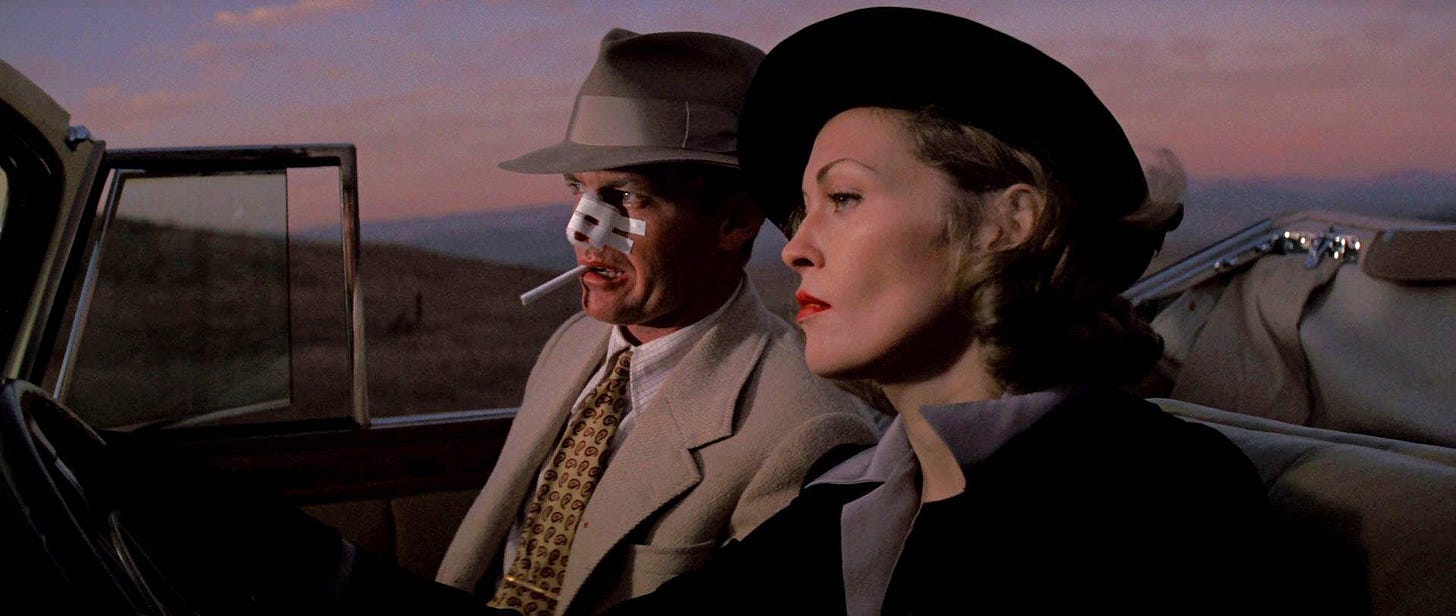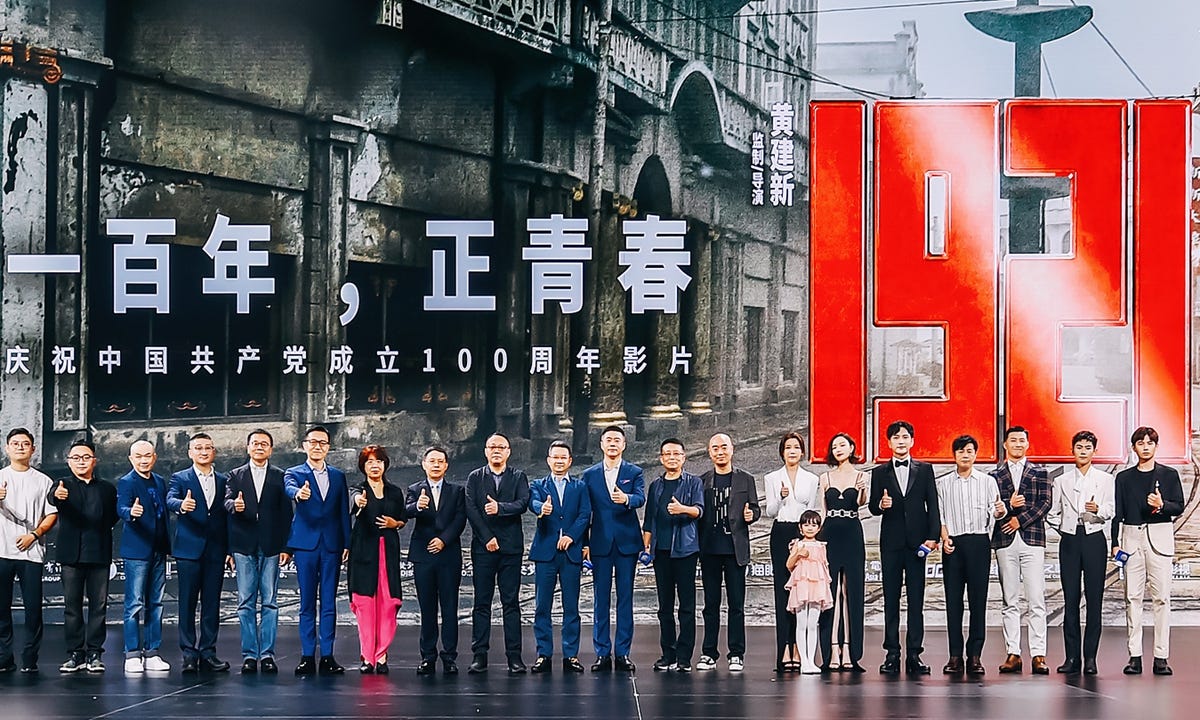Weekly Reel, July 8
#IASolidarity, Tarantino and the Vista Theatre, "Chinatown" Retro-Review, and Chinese v. American Propaganda Films in American Media.
The IATSE is negotiating for a better contract on behalf of its members, which are writers’ assistants, script coordinators, and other mid-level production positions. They’re currently paid under $20 per hour, which in a city as expensive as Los Angeles and in an industry not known for its job security, is simply too little. The positions require demanding hours for the months in which they’re lucky to have work and perhaps worst of all, have to deal with the prima-donna millionaire creatives while maintaining their composure (and silence) among sketchy producers. They’re current contract expires July 31 but their film/television producer counterparts have yet to begin negotiations for another contract, citing Covid hygiene concerns—yet they’re greenlighting film productions with more than 100 workers on set together?
Quentin Tarantino bought another theater, this time the Vista in Los Feliz. Instead of showing double-features of film prints that he owns, the Vista Theatre will “show new movies that come out where they give us a film print.” Also interesting was Tarantino’s take on other theaters:
Some of these exhibitors that are going — I never like to see any movie theater closing — but some of these exhibitors who are going, they fucking deserve to go. They have taken all the specialness out of movies anyway. Some of these chains were they’re showing commercials all through it; they don’t turn the lights down, everything is stadium seating, plastic shit. They have been writing their own epitaph for a long time, but they assumed the business would take you along. It’s been crazy throughout my career to see how the film experience is lessened for the viewer like every five years. However, I do think boutique cinemas actually will thrive in this time. And I am not talking about the La-Z-Boy, order nachos and margaritas … I actually like the Alamo Drafthouse a lot. But I have a living room, I want to go to the theater.
Retro-Review: Chinatown (Roman Polanski, United States, 1974)
The Chinatown script by Robert Towne remains one of the examples of a perfect script that is consistently recommended and dissected in film school screenwriting courses, as it should be. One can learn a great deal about the craft of writing for the screen through it. But the ingenuity and shock of Chinatown is from Roman Polanski’s confident direction. It shows a director at the top of his career, which had unfortunately fallen soon after this film.
The film is about, in short, as I argue, the founding of Los Angeles. Although the discovery of natural resources and Hollywood film industry are the beginnings remembered and taught to others, it was the water wars that secured its existence and grow into the metropolis it is today. This real history is something more boring in which bureaucratic zoning contracts play the most important role but fail to graft well onto the historio-tapestry alongside the glamour of movie stars and lore of Daniel Plainviews. The most important early resident of Los Angeles was William Mulholland, a civil engineer born in Belfast responsible for the 233-mile-long (375 km) Los Angeles Aqueduct, which brings water from the Owens Valley to Los Angeles. The extra supply of water from this flow was channeled into the farmlands of the San Fernando Valley in the north, which Los Angeles incorporated as their own because of a clause not allowing the city to sell water outside its borders. Those who were keen on this plot had bought up the farmers’ land in the Valley knowing property values would boom later. Jack Nicholson plays a private investigator who over the course of the film finds out about this plot and uncovers the Water Department officials and housing speculators behind it.
Today, Mulholland is ironically the name of a long, hilltop road dividing the city of Los Angeles from the San Fernando Valley. (It’s fitting that Nicholson has owned property on Mulholland Drive since 1975, the year after Chinatown’s release, where he was neighbors with Marlon Brando and Warren Beatty.) In the film, Mulholland is split into a couple different characters: Hollis I. Mulwray, the chief engineer of the Los Angeles Department of Water and Power, and Noah Cross, a business partner of Mulwray. They neatly stand for the two sides of one’s duality between hard-working idealist and powerful magnate, which together creates a realistic composite of a person through a fictional medium. And this is essential to the way in which Mulholland and many other historical figures can (or should?) be depicted: the angel on one shoulder with the devil on the other.
I was interested in seeing if the Chinatown’s slow pace holds up in our big-loud era of franchise films and social media. If anything, the bigger and louder the films become, the more a film like Chinatown shines. We follow the events through the perspective of Nicholson, who appears in every scene, and because of that allows the story to unfold organically and by the end scene, shockingly. Towne had originally written a less tragic ending but Polanski re-wrote it a few days before filming with a unique psychological darkness. A man that had seen as a jewish child in Kraków during the Nazi invasion his father being taken away by Germans to a death camp, his mother being sent to Auschwitz, his family and countrymen victims of ethnic genocide, eventually escaping these horrors only to find himself getting a call in London 25 years later that his wife who was eight and a half months pregnant was gruesomely stabbed to death in his home that was about a ten minute ride from Mulholland drive.
Anyways, I certainly recommend this film to all who are curious about the history of Los Angeles that does not involve early Hollywood movie stars and told through a bleak psychological lens.
Essay: Chinese Films are Propaganda but its American Counterparts are Award Winners
The big-budget Chinese film, 1921, was released in China recently, which tells the story about the founding of the Chinese Communist Party 100 years ago as part of the country’s centennial celebrations. Variety reported a month ago with a title that referred to the film as “Chinese Propaganda” because of the censorship involved with the film’s portrayal of real-life heroes and martyrs. There was also an online controversy in China about these portrayals being done by young viral stars; someone on Weibo wondered, “Do the capitalists take us for fools?” But the Chinese censors scrubbed social media of this criticism in anticipation for the July 1st release.
Again, this time a week ago, Variety reported on the film as “Chinese Propaganda” in the title the day after its release. This time the article didn’t report on the censors’ activities in silencing opposition for promoting the film and that it’s release “proved mildly controversial in China,” in reference to the so-called eruption of controversy among “hot-blooded online patriots” from the previous month. It briefly went into some detail about its international distribution and nothing more.
The author of the first Variety piece wrote a follow-up a few days ago, this time omitting the propaganda adjective in the title, instead referring to the film throughout the piece as propaganda. In its first week’s release, 1921 failed to attain the blockbuster ticket sales it set out to reach. The journalist argued it was because the population—as if they know the viewing habits of 1.4 billion people—is hungry for Hollywood blockbusters rather than Chinese political/propaganda films. (A quick google search would confirm that Chinese audiences prefer Chinese films of a wide variety of genres compared to Hollywood blockbusters.) And nowhere in the article is it mentioned that Chinese theaters are at limited capacity. Does this come down to lazy reporting or lazy editing?
But okay, what does this have to do with anything? Why care about the linguistics of several film news articles? Although certainly 1921 was edited by censors in its portrayal of the early Party leaders, martyrs, morality, etc., it’s curious (and unfortunately par for the course) that these American journalists are quick to mention that it’s propaganda—then lie about it being the reason for it’s financial shortcoming—considering the overt/covert involvement of the United States in censoring and/or providing the agenda of both domestic and international films since before the existence the Chinese Communist party.
Let’s take Zero Dark Thirty (2012) as a contemporary example (which everybody outside the US can easily recognize as a propaganda film). It tells the “story of history’s greatest manhunt for the world’s most dangerous man, Osama bin Laden.” The propaganda film’s director Kathryn Bigelow and screenwriter Mark Boal met with various CIA officials at their headquarters in Langley and had been wined and dined off the books where the creative duo received “names of people whose role in the mission was still secret, and shared other classified information.” A Freedom of Information Act request was made to reveal what exactly happened at these meetings (Vice took a deep dive into that FOIA request and published a nice long article), which turned out to be the full commitment of CIA officials for the filmmakers through providing access/information in exchange for a heroic portrayal (“…history’s greatest manhunt for the world’s most dangerous man…”). And this was just a single film production: “The DOD (Department of Defense, or Pentagon) provided military equipment and ‘advice,’ and even allowed members of the military to make appearances, in exchange for some degree of control over the content of 814 films.”
The biggest controversy of the Zero Dark Thirty was in showing that torture was essential in received the information that eventually led to bin Laden’s illegal execution. A Senate intelligence committee investigation into torture after the film’s release found that “CIA interrogators gained no useful information by torturing their victims, either regarding bin Laden’s whereabouts or any other significant security issue.” But that didn’t stop multiple CIA officials publishing op-eds about how torture was, in fact, essential. And at the same time, senior VP of Variety wrote a now-poorly-aged piece that dismissed the controversy of torture as typical awards season mudslinging and compared the looming Senate investigation to a HUAC blacklisting.
The obviously poor metaphor shows the lengths to which trade journalists will go in the service of CIA/DoD soft power in mass media by labeling a Chinese state-backed film as propaganda while celebrating an American state-backed film as a five-time Academy Award nominee. I’ll end with the summary written by Nicholas Schou for The Atlantic article I linked above:
With few exceptions, Hollywood has long functioned as a propaganda factory, churning out jingoistic revenge-fantasy films in which American audiences are allowed to exorcise their post-9/11 demons by watching the satisfying slaughter of countless onscreen jihadis. This never-ending parade of square-jawed secret agents and bearded, pumped-up commandos pitted against swarthy Muslim madmen straight out of central casting has been aided and abetted by a newly emboldened CIA all too happy to offer its “services” to Hollywood.






